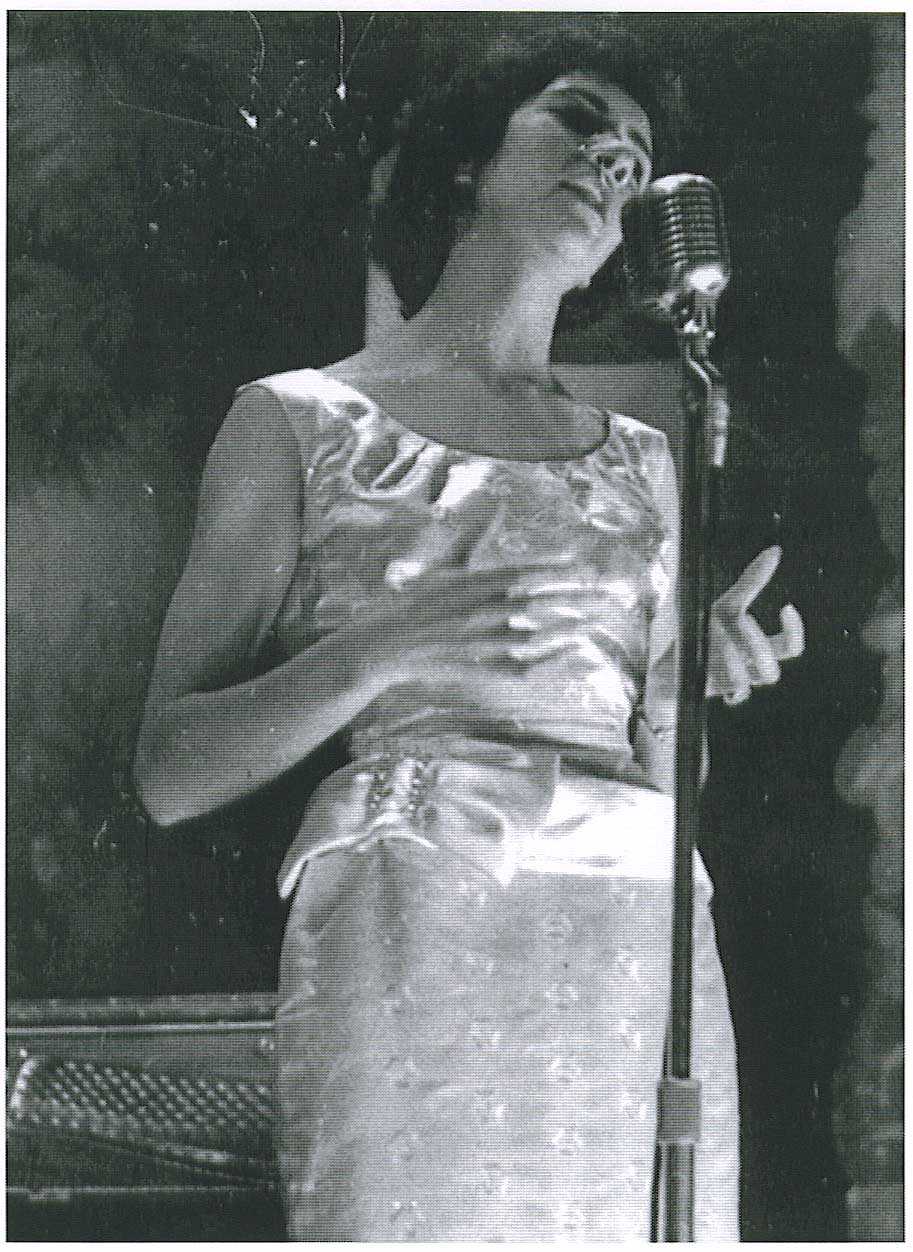

|
By Professor Robin D.G. Kelley Benjamin grew up listening to phonograph records, radio, and her grandmother's humming of the old popular songs from operettas and early Tin Pan Alley musical theater. She also built her repertoire watching British and American movies, and she kept a note pad handy to write down the words of songs she heard on the radio since she had no money for songbooks or sheet music. It was through the radio that she discovered Nat King Cole, Billie Holiday, Doris Day, Ella Fitzgerald, and other jazz and pop singers who would influence her early singing style. She first performed in public in talent contests held at the local cinema during intermission. She continued to develop as a singer, singing in the school choir and even taking a few voice lessons to learn opera. As a choir member, however, she never was assigned a solo because she liked to "scoop" or play around with pitch. Of course, this became a feature of her personal and unique style, but for a formal choir in Cape Town such experiments and embellishments were frowned upon. At age 16, Benjamin graduated from high school and went on to complete two years of teacher training. By the late 1950s, soon after securing her first teaching job at an elementary school in Cape Town, she began to perform at various nightclubs, community dances and social events. However, once the principal found out about her 'moonlighting', he issued an ultimatum - either she stop singing or quit teaching. Benjamin chose the life of a jazz singer. So in 1957, at the age of 21, Beattie Benjamin went on the road with Arthur Klugman's traveling show, ‘Coloured Jazz and Variety’. While the show gave Sathima experience, the entire production was a commercial failure and she, along with friend and fellow band member, Jimmy Adams were stranded in Mafeking until they were able to make enough money performing locally to make it to Johannesburg. There they befriended the great modern alto saxophonist Kippie Moeketsi, who assisted them financially. The pair eventually found work with an African band in Maputo, Mozambique, and traveled wherever they had to in order to make ends meet. She returned to Cape Town around 1959, at a moment when the music scene really flourished but the vice grip of apartheid tightened. There she met and fell in love with the young, innovative pianist/composer Dollar Brand (Abdullah Ibrahim) who even then was reputed to be one of South Africa's greatest jazz musicians. They began working together and in that same year, 1959, recorded what should have been the first jazz LP in South Africa's history. Titled ‘My Songs for You’ with accompaniment by Ibrahim, Joe Colussi on bass and Donald Staegemann on drums, the recording of mostly standards was never released. In addition to working with Ibrahim, she became a regular member of Harold Jephthah's trio, which included the talented but virtually unknown pianist Henry February, with whom she would collaborate on her 1999 release, ‘Cape Town Love’ . Benjamin and Ibrahim's life together in the Cape Town jazz scene was cut short by tragic events in Sharpeville and Langa on March 21, 1960. In both townships, Africans had gathered to protest the pass laws by speaking out and burning their passes. Police violently attacked the demonstrators, killing 69 Africans and wounding at least 196 in Sharpeville alone. Whatever vestiges of democracy existed in South Africa were swiftly eliminated after the Sharpeville massacre. The state passed laws banning all African organizations and permitting 90-day detentions without legal process. Activists were jailed, tortured, and in many cases killed; between 1963-65 alone, at least 190 Africans were hanged. In the aftermath of the Sharpeville Massacre of 1960, Benjamin and Ibrahim decided to join the growing South African exile community in Europe. The couple, along with Ibrahim's rhythm section - bassist Johnny Gertze and drummer Makhaya Ntshoko - settled in Zurich, Switzerland, and worked throughout Germany and Scandinavia. Through various gigs they met some of the greatest American jazz musicians either passing through or living in exile, including Don Byas, Dexter Gordon, Kenny Drew, Ben Webster, Bud Powell, John Coltrane, and Thelonious Monk. The artist who would have the greatest impact on Benjamin, however, was Duke Ellington. Benjamin met Duke Ellington while he was in Zurich for short engagement in February of 1963. Standing in the wings during most of the Ellington band's performance, once the concert ended she insisted that Duke hear her husband's trio at the Club Africana, one of the few local jazz spots where the couple could work fairly regularly. Duke obliged and liked what he heard, but he also insisted that Benjamin sing for him. He adored her voice and promptly arranged for the couple to fly to Paris and record separate albums on the Reprise label (at the time, Ellington was the A&R man for Reprise Records). Ibrahim's record, ‘Duke Ellington Presents The Dollar Brand Trio’, was released the following year and subsequently helped him build a following in Europe and the US. Benjamin's recording, unfortunately, languished in the vault because Reprise executives did not think she was "commercial" enough. It was eventually released under the title ‘A Morning in Paris’, but not until 1996. Benjamin continued to maintain a relationship with Ellington, who remained an enthusiastic supporter of her career. In 1965, Ellington arranged to have Benjamin perform with the band at the Newport Jazz Festival. At one point, Ellington had even asked her to join his band permanently, but she declined because being on the road would have taken her away from Ibrahim, whom she married in February of 1965. Throughout the 1960s Benjamin and Ibrahim moved back and forth between Europe and New York City, where they struggled to make it in the jazz world. For Benjamin, who had yet to release a recording of her own, gigs were few and far between. She gave birth to her son, Tsakwe, in 1971 and spent much of her time as a mother and supporter of her husband. 1976 marked a turning point for Benjamin. She and Ibrahim returned to South Africa to live, she gave birth to her daughter Tsidi, and she went into the studio and recorded ‘African Songbird‘, the first album of hers to be released. The LP, made up entirely of original compositions by Benjamin, not only unveiled her talent as a composer but it revealed an interest in the freedom struggle in South Africa. A few months later, that interest became a full-blown engagement after the schoolchildren of Soweto rose up to protest the state's decision to teach math and social studies in Afrikaans instead of English. Once again, the police retaliated against the protesters but the damage this time around was worse than Sharpeville: at least 575 Africans were killed and 2,389 wounded. This was enough to convince Benjamin and Ibrahim to go back into exile. So in 1977 they returned to New York, settled into the Chelsea Hotel, and they both became politically active in behalf of the African National Congress. As a result of their activities as cultural workers for the liberation movement, the apartheid government of South Africa revoked their citizenship, thus compelling them to become US citizens. Artistically, Benjamin began to take greater control of her career. In 1979, she launched her own record label, Ekapa, primarily to produce and distribute her music. Between 1979 and 2002, she released eight albums: ‘Sathima Sings Ellington’, ‘Dedications’, ‘Memories and Dreams’, ‘Windsong’, ‘Lovelight’, ‘Southern Touch’, ‘Cape Town Love’, and ‘Musical Echoes’. Each of these recordings received rave reviews, and ‘Dedications’ was nominated for a Grammy in 1982. A mix of standards, old Tin Pan Alley songs, and original compositions, these recordings reveal the full range of her talent as a singer, songwriter, and bandleader. Indeed, she brought together some of the most talented musicians on the scene to accompany her, including pianists Kenny Baron and Onaje Allan Gumbs, drummers Billy Higgins and Ben Riley, and bassist Buster Williams. Like other great vocalists in the jazz tradition, she is a remarkable storyteller, delivering lyrics with such patience and emotion that listeners are compelled to hang on to every word. She doesn't rely on vocal acrobatics or melisma -- just pure, crystalline sound. As New York Times critic Jon Pareles wrote twenty-two years ago, "In song after song, Miss Benjamin could make a word cry out with just a flicker of vibrato." As a composer, pieces such as ‘Music’, ‘Lady Day’, ‘Dreams’, and ‘Gift of Love’ (for Duke Ellington) are really poems set to gorgeous, uncluttered melodies. Her controversial ‘Liberation Suite’ (1982) comprised of three compositions, ‘New Nations a Coming’, ‘Children of Soweto’, and ‘Africa’, marked a departure from most ‘political music’ that attempted to speak to the conditions of black South Africans. These pieces point to the future rather than dwell on the current crises, emphasizing love over conflict and violence. As an arranger, she made her own mark on the music by incorporating ‘Cape Town Rhythms’, the distinctive shuffle beat common in the popular dance music of her native land. She has recorded songs such as ‘In a Mellow Tone’ and ‘I'm Getting Sentimental Over You’ over these unique uptempo rhythms and as a result produced truly original renderings of classic songs. Bringing together her two worlds - Cape Town and New York City - has been an essential element of Benjamin's music. She has recorded in both places and, for the most part, used American musicians for her US recordings and South African musicians when in her native land. However, for her most recent CD, ‘Musical Echoes’, she decided to bring the outstanding American pianist and collaborator, Stephen Scott, to Cape Town to record with South Africans, bassist Basil Moses and drummer Lulu Gontsana. The result is a true synthesis of both worlds, and one of her most brilliant records to date. Sathima Bea Benjamin continues to perform and record when opportunities arise, and over the past four decades she has always enjoyed enthusiastic reviews. Recently she has begun to receive the kinds of accolades deserving of an artist of her stature. In October of 2004, South African President Thabo Mbeki bestowed upon her the Order of Ikhamanga Silver Award in recognition for her "excellent contribution as a jazz artist" in South Africa and internationally, as well as for her contribution "to the struggle against apartheid." And in March of 2005, the prestigious art group, Pen and Brush, Inc., presented her with a Certificate of Achievement for her work as a performer, musician, composer, and "activist in the struggle for human rights in South Africa." Finally, she is the subject of a forthcoming documentary produced and directed by Angelica Mills. It is scheduled for completion in the Spring of 2006. |
